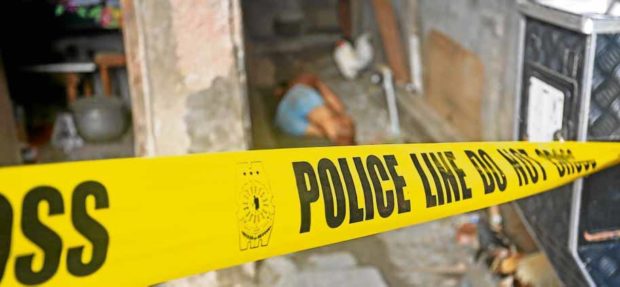‘Killing is new normal’

CULTURE OF IMPUNITY A police tape prevents kibitzers from getting near the body of an unidentified man killed during an antidrug operation in Talisay City, Cebu province. —LITO TECSON/CEBU DAILYNEWS
An outspoken Church critic of killings associated with President Rodrigo Duterte’s antidrug campaign appealed to people not to get numbed by the daily bloodshed they saw on the streets, warning that time would come when relatives of those unjustly slain would seek justice through revenge.
“Violence begets violence,” Caloocan Bishop Pablo Virgilio David said in an interview.
“The drug war has bred a culture of impunity. Killing has become a new normal,” he said.
Routine bloodshed
“People just watch and go on with business as usual. They have even gotten used to watching the killings as they happen and go past the victims unaffected,” he added.
“Children are exposed to so much violence,” David said.
David and a group supporting relatives of victims of street executions denounced what they said was the unabated violence and impunity which had become routine following the launch of the President’s antidrug campaign, which he had described as “chilling and relentless.”
David said what alarmed him was the possibility of some victims’ families resorting to violence to bring justice to their loved ones.
Devastating impact
He also expressed fears for people reported missing after they had been linked to drugs.
“We’ve had cases of people abducted before, but their dead bodies were usually dumped a few days later,” David said.
Baigani, a group that supports wives, mothers and children of summary killings, said losing a parent might have devastating effects on children.
“Many of the families affected by the war on drugs are young families with children as young as newborns, and the rest are in their teens,” the group said.
“Left by one or both parents who have been killed or incarcerated, the young children are thrown into deep poverty with no support from the government at the local or national level,” it said.
Baigani was set to publish later this year a study conducted in three Metro Manila cities on the impact of the drug war on families.
It was prepared with Miriam College Department of Social Work, Ateneo de Manila University Department of Psychology and the Diocese of Novaliches.
David said he and Baigani continued to monitor drug-related killings in the Diocese of Kalookan, which comprised Caloocan City-South, Malabon City and Navotas City.
From Oct. 7 to 12 alone, the diocese recorded six summary killings in Caloocan, including the shooting of PO1 Marvin Anthony German at the village of 46.
German was shot by two motorcycle-riding assailants.
Regular occurrence
The list of people killed by motorcycle-riding men also included Noel Aljezera, 41, a known addict who was shot and killed on an overpass along Edsa at Bagong Barrio, Barangay 138, past 7 p.m. on Oct. 7.
PO3 Ernesto Estrellas, 37, was shot along C3 Road the following day.
On Oct. 10, around 10 p.m., 26-year-old single mother Clariz Marie Ocampo was also shot and killed by unknown assailants along Don Vicente Ang Street at Bagong Barrio.
Police later tagged Ocampo as a possible “police asset” and said a sachet of “shabu” (crystal meth) was found in her pocket.
Baigani said the sudden loss of a mother, like Ocampo, in a family could lead to worse events for children.














